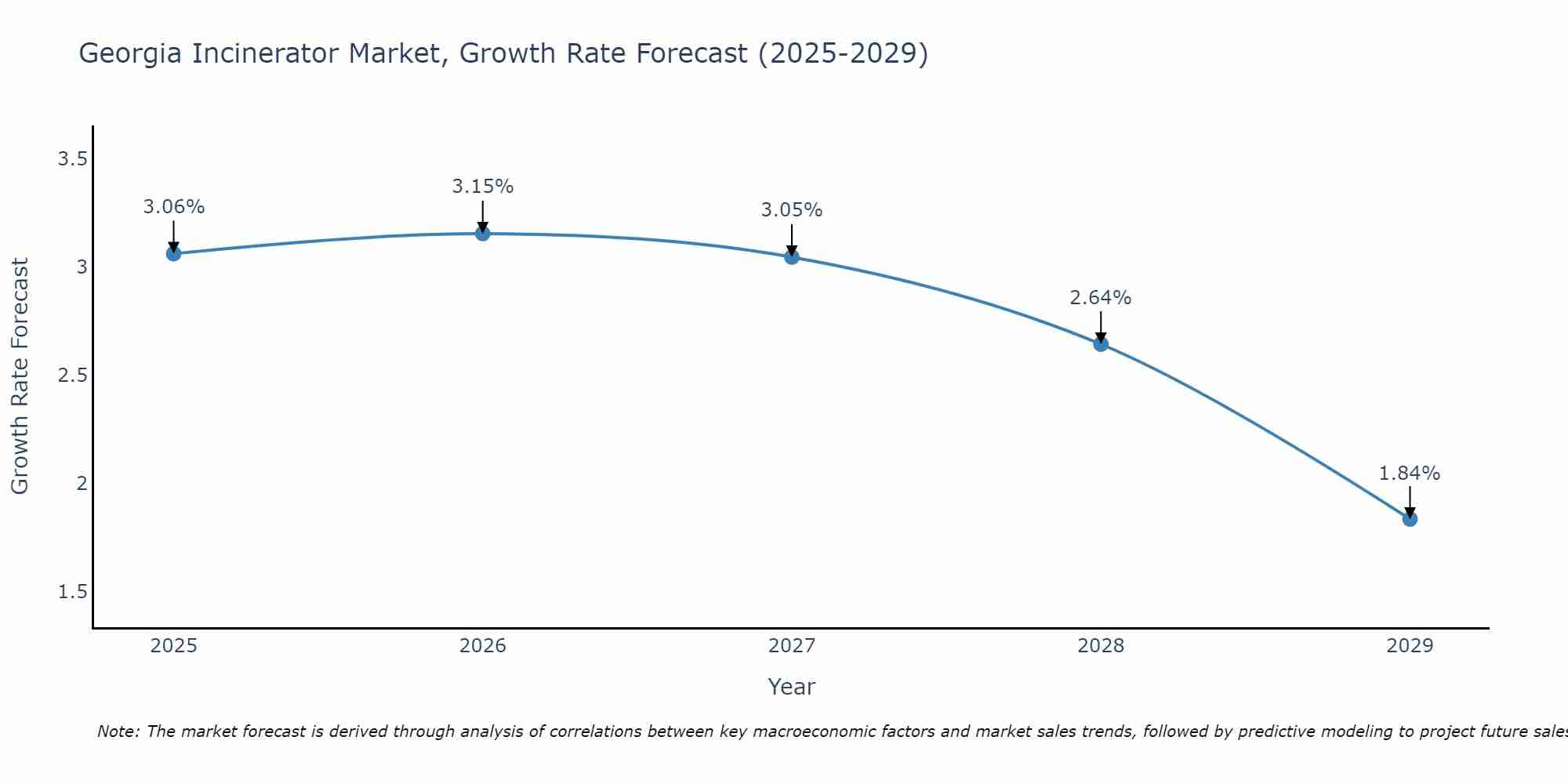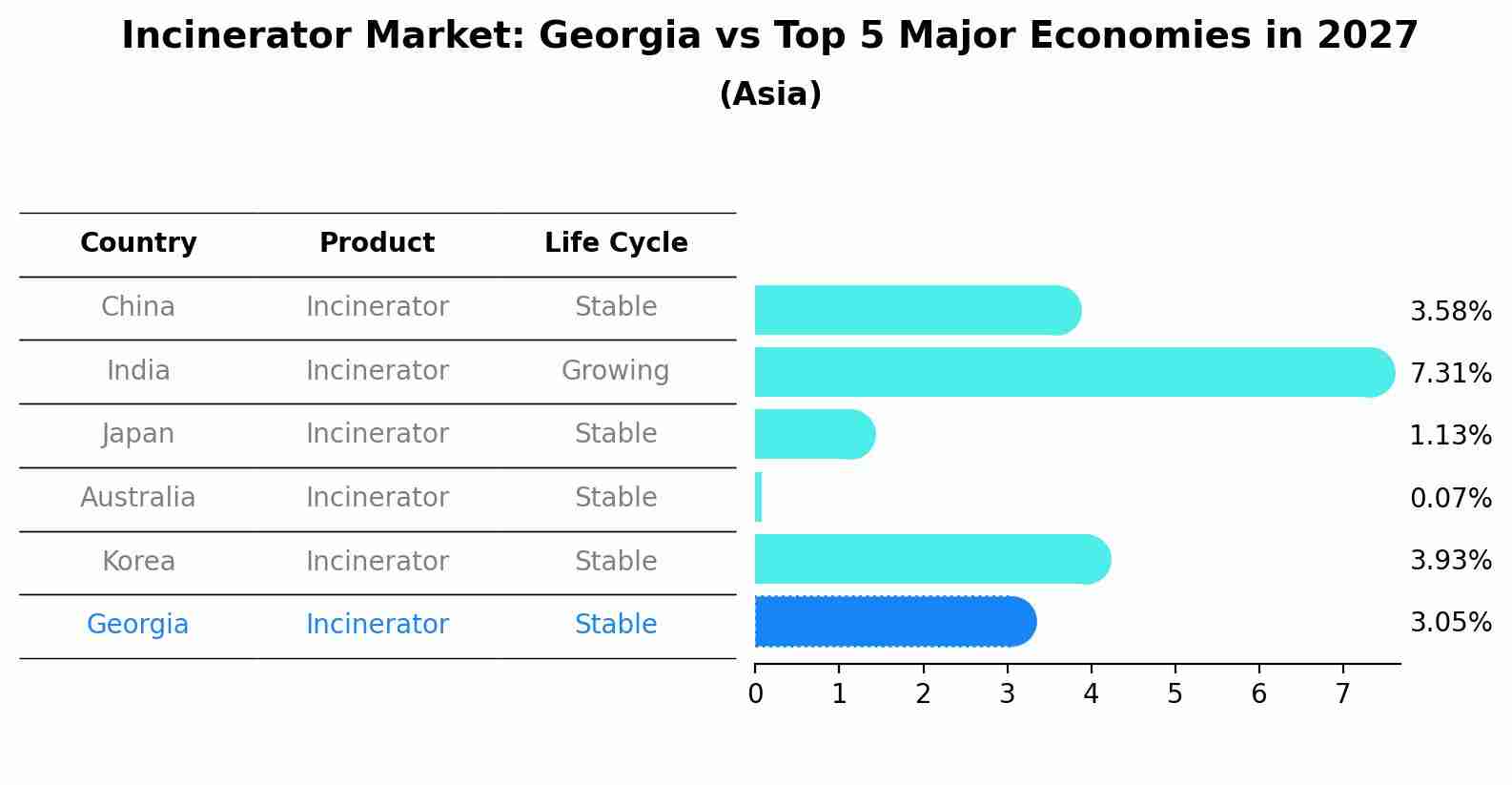Georgia Incinerator Market (2025-2031) Outlook | Analysis, Trends, Share, Size, Forecast, Industry, Value, Companies, Revenue & Growth
| Product Code: ETC130173 | Publication Date: Jun 2021 | Updated Date: Jun 2025 | Product Type: Report | |
| Publisher: 6Wresearch | Author: Vasudha | No. of Pages: 70 | No. of Figures: 35 | No. of Tables: 5 |
Georgia Incinerator Market Size Growth Rate
The Georgia Incinerator Market is projected to witness mixed growth rate patterns during 2025 to 2029. Starting at 3.06% in 2025, the market peaks at 3.15% in 2026, and settles at 1.84% by 2029.

Incinerator Market: Georgia vs Top 5 Major Economies in 2027 (Asia)
The Incinerator market in Georgia is projected to grow at a stable growth rate of 3.05% by 2027, highlighting the country's increasing focus on advanced technologies within the Asia region, where China holds the dominant position, followed closely by India, Japan, Australia and South Korea, shaping overall regional demand.

Georgia Incinerator Market Overview
The Georgia Incinerator Market is experiencing steady growth driven by increasing waste generation and the need for efficient waste management solutions in the state. Incineration technology is being increasingly adopted due to its ability to reduce waste volume, minimize landfill usage, and generate energy through the process. Key players in the market are focusing on technological advancements to enhance efficiency, reduce emissions, and comply with stringent environmental regulations. The market is witnessing a trend towards the adoption of waste-to-energy incinerators, which offer a sustainable solution for waste disposal while generating electricity. Government initiatives promoting waste-to-energy solutions and increasing awareness about the benefits of incineration are further propelling market growth in Georgia. Overall, the Georgia Incinerator Market presents opportunities for innovation and sustainable waste management practices in the state.
Georgia Incinerator Market Trends
The Georgia incinerator market is experiencing a growing demand for advanced technologies that enhance energy efficiency and reduce emissions. With increasing environmental regulations and a shift towards sustainable waste management practices, incinerator operators in Georgia are investing in innovative solutions such as waste-to-energy systems and emission control technologies. Additionally, there is a trend towards the development of smaller-scale modular incinerators that can cater to the needs of smaller communities and businesses. The market is also witnessing a rise in partnerships and collaborations between incinerator manufacturers and technology providers to offer comprehensive solutions that address both waste disposal and energy generation requirements. Overall, the Georgia incinerator market is evolving towards more sustainable and efficient solutions to meet the growing waste management needs of the state.
Georgia Incinerator Market Challenges
In the Georgia incinerator market, one of the key challenges faced is the regulatory environment surrounding waste management and emissions control. Stricter regulations on air quality and emissions from incineration plants can significantly impact the operation and expansion of incinerator facilities in the state. Additionally, public perception and community opposition to incineration as a waste disposal method can pose challenges in obtaining necessary permits and approvals for new incinerator projects. Competition from alternative waste management technologies, such as recycling and composting, also presents a challenge for incinerator operators in Georgia. Overall, navigating these regulatory, public perception, and competitive challenges is essential for the sustainable growth and success of the incinerator market in Georgia.
Georgia Incinerator Market Investment Opportunities
The Georgia incinerator market presents promising investment opportunities driven by the increasing focus on waste management and environmental sustainability. With the state`s growing population and industrial activities, there is a rising need for efficient waste disposal solutions. Investors can explore opportunities in developing advanced incineration technologies that offer clean and energy-efficient waste-to-energy solutions. Additionally, there is potential for offering incinerator services to municipalities and businesses looking to streamline their waste management processes. Partnering with government agencies and environmental organizations to promote eco-friendly incineration practices can also be a strategic investment move in the Georgia market. Overall, the Georgia incinerator market offers a conducive environment for innovative solutions that address the challenges of waste management while contributing to sustainable development goals.
Georgia Incinerator Market Government Policy
The Georgia Incinerator Market is primarily influenced by state and local government policies regulating waste management and environmental protection. Georgia`s Department of Community Affairs oversees solid waste management regulations, including permitting and compliance for incineration facilities. The state also has air quality standards set by the Georgia Environmental Protection Division that incinerator operators must adhere to. Local governments may impose additional zoning restrictions or permit requirements for incinerator projects. Additionally, Georgia has incentives for renewable energy projects, which could potentially benefit incinerator operators looking to generate electricity from waste. Overall, the Georgia Incinerator Market is shaped by a mix of regulations aimed at balancing waste management needs with environmental sustainability goals.
Georgia Incinerator Market Future Outlook
The future outlook for the Georgia Incinerator Market appears promising, driven by increasing waste generation and the need for efficient waste management solutions. With a growing population and industrial activities in the region, there is a rising demand for sustainable waste disposal methods, favoring the adoption of incineration technologies. Government regulations promoting waste-to-energy initiatives also provide opportunities for market growth. Additionally, advancements in incinerator technology, such as improved efficiency and emissions control, are likely to further drive market expansion in Georgia. Overall, the market is anticipated to witness steady growth as stakeholders increasingly prioritize environmentally friendly waste management practices.
Key Highlights of the Report:
- Georgia Incinerator Market Outlook
- Market Size of Georgia Incinerator Market, 2021
- Forecast of Georgia Incinerator Market, 2031
- Historical Data and Forecast of Georgia Incinerator Revenues & Volume for the Period 2021 - 2031
- Georgia Incinerator Market Trend Evolution
- Georgia Incinerator Market Drivers and Challenges
- Georgia Incinerator Price Trends
- Georgia Incinerator Porter's Five Forces
- Georgia Incinerator Industry Life Cycle
- Historical Data and Forecast of Georgia Incinerator Market Revenues & Volume By Product Type for the Period 2021 - 2031
- Historical Data and Forecast of Georgia Incinerator Market Revenues & Volume By Moving Grate for the Period 2021 - 2031
- Historical Data and Forecast of Georgia Incinerator Market Revenues & Volume By Static Hearth, Furnace and Multiple Hearth for the Period 2021 - 2031
- Historical Data and Forecast of Georgia Incinerator Market Revenues & Volume By Rotary Kiln for the Period 2021 - 2031
- Historical Data and Forecast of Georgia Incinerator Market Revenues & Volume By Fluidized Bed for the Period 2021 - 2031
- Historical Data and Forecast of Georgia Incinerator Market Revenues & Volume By End-user for the Period 2021 - 2031
- Historical Data and Forecast of Georgia Incinerator Market Revenues & Volume By Municipal Sector for the Period 2021 - 2031
- Historical Data and Forecast of Georgia Incinerator Market Revenues & Volume By Industrial Sector for the Period 2021 - 2031
- Georgia Incinerator Import Export Trade Statistics
- Market Opportunity Assessment By Product Type
- Market Opportunity Assessment By End-user
- Georgia Incinerator Top Companies Market Share
- Georgia Incinerator Competitive Benchmarking By Technical and Operational Parameters
- Georgia Incinerator Company Profiles
- Georgia Incinerator Key Strategic Recommendations
Frequently Asked Questions About the Market Study (FAQs):
Georgia Incinerator |
1 Executive Summary |
2 Introduction |
2.1 Key Highlights of the Report |
2.2 Report Description |
2.3 Market Scope & Segmentation |
2.4 Research Methodology |
2.5 Assumptions |
3 Georgia Incinerator Market Overview |
3.1 Georgia Country Macro Economic Indicators |
3.2 Georgia Incinerator Market Revenues & Volume, 2021 & 2031F |
3.3 Georgia Incinerator Market - Industry Life Cycle |
3.4 Georgia Incinerator Market - Porter's Five Forces |
3.5 Georgia Incinerator Market Revenues & Volume Share, By Product Type, 2021 & 2031F |
3.6 Georgia Incinerator Market Revenues & Volume Share, By End-user, 2021 & 2031F |
4 Georgia Incinerator Market Dynamics |
4.1 Impact Analysis |
4.2 Market Drivers |
4.3 Market Restraints |
5 Georgia Incinerator Market Trends |
6 Georgia Incinerator Market, By Types |
6.1 Georgia Incinerator Market, By Product Type |
6.1.1 Overview and Analysis |
6.1.2 Georgia Incinerator Market Revenues & Volume, By Product Type, 2018 - 2027F |
6.1.3 Georgia Incinerator Market Revenues & Volume, By Moving Grate, 2018 - 2027F |
6.1.4 Georgia Incinerator Market Revenues & Volume, By Static Hearth, Furnace and Multiple Hearth, 2018 - 2027F |
6.1.5 Georgia Incinerator Market Revenues & Volume, By Rotary Kiln, 2018 - 2027F |
6.1.6 Georgia Incinerator Market Revenues & Volume, By Fluidized Bed, 2018 - 2027F |
6.2 Georgia Incinerator Market, By End-user |
6.2.1 Overview and Analysis |
6.2.2 Georgia Incinerator Market Revenues & Volume, By Municipal Sector, 2018 - 2027F |
6.2.3 Georgia Incinerator Market Revenues & Volume, By Industrial Sector, 2018 - 2027F |
7 Georgia Incinerator Market Import-Export Trade Statistics |
7.1 Georgia Incinerator Market Export to Major Countries |
7.2 Georgia Incinerator Market Imports from Major Countries |
8 Georgia Incinerator Market Key Performance Indicators |
9 Georgia Incinerator Market - Opportunity Assessment |
9.1 Georgia Incinerator Market Opportunity Assessment, By Product Type, 2021 & 2031F |
9.2 Georgia Incinerator Market Opportunity Assessment, By End-user, 2021 & 2031F |
10 Georgia Incinerator Market - Competitive Landscape |
10.1 Georgia Incinerator Market Revenue Share, By Companies, 2021 |
10.2 Georgia Incinerator Market Competitive Benchmarking, By Operating and Technical Parameters |
11 Company Profiles |
12 Recommendations |
13 Disclaimer |
- Single User License$ 1,995
- Department License$ 2,400
- Site License$ 3,120
- Global License$ 3,795
Search
Thought Leadership and Analyst Meet
Our Clients
Related Reports
- Afghanistan Apparel Market (2026-2032) | Growth, Outlook, Industry, Segmentation, Forecast, Size, Companies, Trends, Value, Share, Analysis & Revenue
- Canada Oil and Gas Market (2026-2032) | Share, Segmentation, Value, Industry, Trends, Forecast, Analysis, Size & Revenue, Growth, Competitive Landscape, Outlook, Companies
- Germany Breakfast Food Market (2026-2032) | Industry, Share, Growth, Size, Companies, Value, Analysis, Revenue, Trends, Forecast & Outlook
- Australia Briquette Market (2025-2031) | Growth, Size, Revenue, Forecast, Analysis, Trends, Value, Share, Industry & Companies
- Vietnam System Integrator Market (2025-2031) | Size, Companies, Analysis, Industry, Value, Forecast, Growth, Trends, Revenue & Share
- ASEAN and Thailand Brain Health Supplements Market (2025-2031) | Strategy, Consumer Insights, Analysis, Investment Trends, Opportunities, Growth, Size, Share, Industry, Revenue, Segments, Value, Segmentation, Supply, Forecast, Restraints, Outlook, Competition, Drivers, Trends, Demand, Pricing Analysis, Competitive, Strategic Insights, Companies, Challenges
- ASEAN Bearings Market (2025-2031) | Strategy, Consumer Insights, Analysis, Investment Trends, Opportunities, Growth, Size, Share, Industry, Revenue, Segments, Value, Segmentation, Supply, Forecast, Restraints, Outlook, Competition, Drivers, Trends, Demand, Pricing Analysis, Competitive, Strategic Insights, Companies, Challenges
- Europe Flooring Market (2025-2031) | Outlook, Share, Industry, Trends, Forecast, Companies, Revenue, Size, Analysis, Growth & Value
- Saudi Arabia Manlift Market (2025-2031) | Outlook, Size, Growth, Trends, Companies, Industry, Revenue, Value, Share, Forecast & Analysis
- Uganda Excavator, Crane, and Wheel Loaders Market (2025-2031) | Strategy, Consumer Insights, Analysis, Investment Trends, Opportunities, Growth, Size, Share, Industry, Revenue, Segments, Value, Segmentation, Supply, Forecast, Restraints, Outlook, Competition, Drivers, Trends, Demand, Pricing Analysis, Competitive, Strategic Insights, Companies, Challenges
Industry Events and Analyst Meet
Whitepaper
- Middle East & Africa Commercial Security Market Click here to view more.
- Middle East & Africa Fire Safety Systems & Equipment Market Click here to view more.
- GCC Drone Market Click here to view more.
- Middle East Lighting Fixture Market Click here to view more.
- GCC Physical & Perimeter Security Market Click here to view more.
6WResearch In News
- Doha a strategic location for EV manufacturing hub: IPA Qatar
- Demand for luxury TVs surging in the GCC, says Samsung
- Empowering Growth: The Thriving Journey of Bangladesh’s Cable Industry
- Demand for luxury TVs surging in the GCC, says Samsung
- Video call with a traditional healer? Once unthinkable, it’s now common in South Africa
- Intelligent Buildings To Smooth GCC’s Path To Net Zero


















